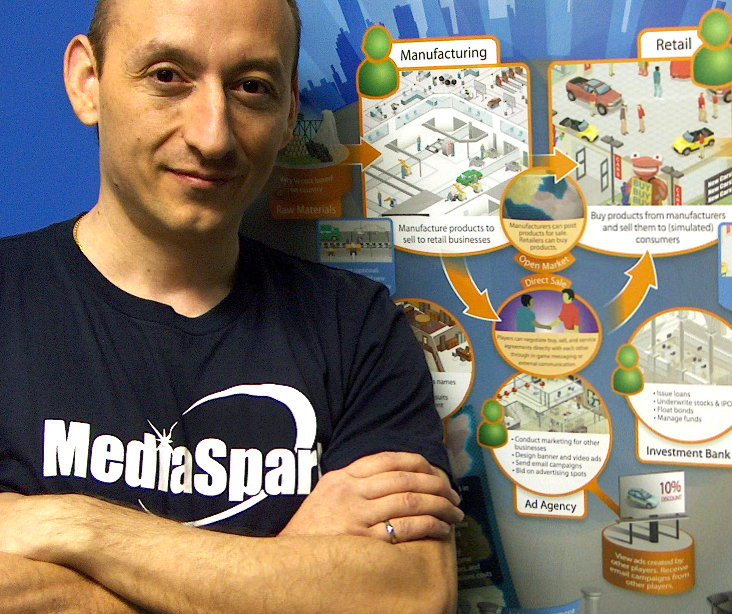Read about the creation of goCapeBreton.com from founder Mathew Georghiou and his observations on why Cape Breton has declined economically, despite an estimated $1 billion having been spent in the name of economic development.
This article was first published in Cape Breton Business Magazine , Spring 2014.
By Mathew Georghiou , founder of goCapeBreton.com
.....

In the 20 years since I returned to Cape Breton to start a technology company, I have seen a desire for change grow from a small group of people to what, I think, is now becoming a critical mass. It appears that more Cape Bretoners than ever are coming to the realization that it is time for a change in the ways we have been approaching the relentless decline of our community.
I believe the challenge we have to overcome is that of spending so much of our attention, and passion, on molehills, like potholes and heavy garbage collection, and, instead, focus on the much larger and important mountain: our economy.
One of the strongest regrets I have with living and working in Cape Breton is that, over and over, for the past 20 years, we have been having the very same conversations about our problems and what we should do about them. The same conversations, the same problems, the same lack of solutions. This is deeply frustrating because we have always had the resources to achieve great things, and as a people, we have been widely known for our ability to face adversity and overcome.
Unlike most of the thousands of other struggling communities in North America, Cape Breton has strong infrastructure, talented and resourceful people who truly care about the community, a large number of organizations whose missions include economic development, plus we have had money … and lots of it. By my estimate, one billion dollars has been spent in the name of economic development here in the past 20 years. With a population of less than 150,000, that is a great deal of money. And, that figure does not include the hundreds of millions of dollars spent on large projects like the tar ponds cleanup and mine remediation.
Despite our challenges, our resilience as a people persists, as it always has. Yet, we continue to fail in stemming our downward slide. This failure is not exclusive to Cape Breton, as it appears that our entire province is moving into the red zone.
Where are we going wrong?
Some say it is because we lack a positive can-do attitude. Certainly, attitude helps, but as an engineer, I happen to know that a positive attitude is not going to keep the bridge from crumbling.
Some advocate that there is too much government involvement in economic development and that government should only provide formalized tax incentives. I think this view is narrow sighted. Tax savings alone cannot lead to economic success, particularly in smaller communities where the private sector is neither strong nor cohesive enough to drive change.
The issue is much more complex.
In my years of working to try to encourage smart decisions to be made in economic development, I have been up-close and personal with community leaders, government officials, CEOs, entrepreneurs, Premiers, Senators, MPs, MLAs, Mayors, Councillors, and the Prime Minister's Office. I have seen what few others have seen, and I could draft a very thorough list of who carries the blame for our failures. In fact, I could name names.
One thing I have learned from all this is that our failure has nothing to do with liberal or conservative views, nor is it because of some organized conspiracy against Cape Breton. Instead, it has more to do with personal and political agendas that overshadow the common good. Some of these personal agendas have been calculated, while others are just simple human nature. It is for these same reasons that wealthy countries like Canada continue to have high rates of poverty, problematic healthcare systems, and other serious social problems.
We are distracted. We are all busy living our lives, trying to do better for ourselves and our families. And, sometimes, that means focusing on "what's in it for me" more so than focusing on the greater good. It is human nature. Plus, most of us are never in a position to have our decisions affect the broader community in any significant way. The big decisions seem to be left to small groups of people in a community. As a society, we continually rely on these small groups to solve the big problems, like economic development.
The broader community has little opportunity to participate in community economic development in any meaningful way because there is no structured way to do so. We are all busy living our lives day to day, struggling with our own personal challenges. When we hear about something happening in the community, we often do not know whether we should cheer or jeer, because it seems we never really have the full story.
So, the silent majority of citizens, who are often willing to look at things rationally, tend to let the news pass by, while the vocal minority, who often act irrationally, make their voices heard very clearly. The result is that small issues and stories get much more attention than the larger, and more serious, challenges we face.
It is difficult for most people to act if they do not have the right information at the right time. I believe that it is this lack of information that prevents wider community involvement in economic development, and allows the personal and political agendas of a few to influence outcomes.
I believe that if we all knew more about what is happening in our community, there would be much more accountability. A lot more. And, accountability leads to better decision making. I am talking here about social accountability . The responsibility we have to each other and how we emotionally feel about this responsibility when we are accepting or avoiding it. The more information we have about what is happening in our community, good and bad, the more we are able to influence its direction.
The control of information has tremendous influence on a community. We may live in a democracy, but the more our information is controlled by small groups of people, the more control they have over us collectively, whether those people intend to exercise this control or not, for positive reasons or negative. This may not be something that we think about every day, but it chips away at our community, slowly but surely.
We have seen, the world over, the power of information control by oppressive regimes and how they can fall when the flow of information is opened. We have also seen it here in Cape Breton over the years when certain local economic development projects have had citizens spontaneously rallying around them, even when many did not truly understand the underlying issues.
Despite the fact that we live in one of the greatest democracies in the world, our local information is not democratized. This is true for most communities around the world. Information is controlled by small groups of people, whether they are news publishers, the media, government agencies, or community and business leaders. Some of these people are focused on personal agendas while others have good intentions and may even want to share their information, but have no easy way of doing so. Whatever the intentions, the lack of information flow contributes to our failures.
Why is information flow so important? Because, information flow is the foundation of our social capital.
The truth is that economic development is less about roads, buildings, and institutions, and more about people. More specifically, the skills of our people and the relationships between people within the community, and around the world. Good things happen when people share ideas, resources, talents, and capital with each other. This is called social capital. Every community has social capital. The challenge we face is how to build and unlock it because it cannot be done without proper information flow
The economic success of Silicon Valley in the US, which world leaders are feverishly attempting to replicate, is not because of a particular person, company, venture capitalist, or government program. It is because of the wealth of social capital that has been nurtured in that region over decades of activity. Most Canadian economic development initiatives are focused on creating "programs" that attempt to reproduce individual elements of this success. These approaches fail to recognize that it is not the individual components of the region, but the entire ecosystem, that is responsible for its success.
How can we build such an ecosystem here? I believe we can do so by facilitating the creation and distribution of information that is vital to economic development. And, we must do so by providing our community with the information needed to work, live, and play. By simply having the right information, at the right time, we can advance the economic objectives of our community in a natural and structured way. People do not have to know or care that they are facilitating economic development – they are simply trying to better their lives. This could include finding a new job, registering for a course, starting a business, or attending a fun event.
On the surface, it may appear difficult to envision how the simple sharing of information can have such a profound and positive influence on a local community. However, all we have to do is look to Facebook, Twitter, YouTube, and other Internet platforms as proof of this on a global scale.
Now, stop for a moment, and consider how that same power, with a hyperlocal focus , could transform our community. We would be able to connect friends and families, people to jobs, volunteers to good causes, students to education, businesses to customers, sports fans to local results, and our community to each other…and to the world. These are the activities that build social capital and nurture a community ecosystem that will achieve long term success.
And this is what led to the creation of goCapeBreton.com and www.lokol.me
This article was originally published in Cape Breton Business Magazine , Spring 2014 Issue, by Seashore Publishing
Read it here: http://issuu.com/seashorepublishing/docs/cb_business_sp-2014/28






5
Log In or Sign Up to add a comment.- 1
arrow-eseek-e1 - 4 of 4 itemsFacebook Comments